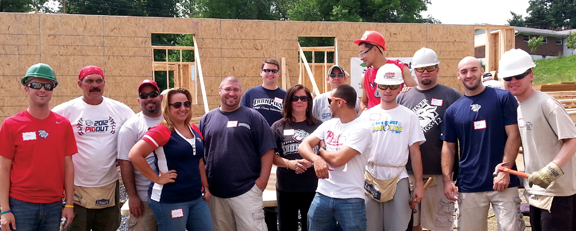Habitat For Humanity of the Lehigh Valley
by Sara Vigneri
photo by Deb Cummins
At the height of the real estate bubble of 2007, homeownership was suddenly accessible to everyone. Mortgages were handed out to anyone with a pulse and families who never imagined owning a house were able to snag a bank loan and move in to their dream home. Unfortunately, too many people bit off more than they could chew during that mad mortgage rush and ended up trapped in houses they couldn’t afford or kicked out of their homes as they went into foreclosure.
Yet during this insane housing bubble, a group in the Lehigh Valley slowly and steadily helped people secure financing to buy homes, guided them on the best ways to budget their income to ensure they didn’t get in over their head, and asked them to pitch in some muscle to help build it.
Since 1989, Habitat for Humanity of the Lehigh Valley placed nearly 100 families in homes across Easton, Allentown and Bethlehem using a multifaceted approach to ensure long-term stability for homeowners. “I like to call what we do a Rubik’s Cube,” says Deb Cummins, Executive Director of Habitat for Humanity of the Lehigh Valley. “We are a bank providing mortgages, we are a construction company building houses, we manage volunteers, we run a store and we also work as social workers and community developers.”
Habitat’s vision of a world “where everyone has a decent place to live” is noble in and of itself, but their strategies to achieve that vision are truly inspiring. To qualify for a Habitat home, you have to meet certain income guidelines to ensure that you can make the monthly mortgage payment.
They will review your current bills, income and bank statements to make sure no one gets into a mortgage they can’t afford (however, the Habitat mortgages are still kept very low, often between $600 and $750 per month). If approved for a Habitat mortgage, a family is assigned a mentor who guides them through the entire process of homeownership, including what they call ‘sweat equity hours.’ “Sweat equity is a partnership,” explains Cummins.
“Habitat families have to put in 250 hours of work into their homes from the time they apply for the house to closing. It can take two years, and can add up to an extra full work day for them.” But with this combination of financial mentoring and physical investment in building your own home, Habitat ensures that when they hand over the keys on closing day the homeowners will be there to stay. “Our goal is to make sure they are set up to be successful homeowners,” says Cummins.
In addition to their work getting people into homes, Habitat recently opened a store to allow for donations and to help generate income for the organization. “Before the store,” explains Cummins, “we had people calling asking if they could donate building supplies, but it was too difficult to coordinate specific donations to our building projects.” So they opened ReStore, a retail location in Allentown that accepts donations of building materials and sells them back to the public to offset operational costs for Habitat while also helping keep useful materials out of landfills. Have some extra tiles from your bathroom remodel? Ordered the wrong faucet handle? Have extra tools you never use? Anyone can donate and they have a truck that can pick up items from your home as long as they are in good condition. And of course everyone is invited to come in and peruse their inventory. “ReStore is a treasure hunt,” says Cummins. “We have a lot of retro items, we recently had a hand carved wood table that
someone donated.”
And while Habitat relies on financial donations, a major key to the success of this organization is their volunteers, some of whom come out three days a week to help build houses. In addition to builders, they have volunteer mentors and professional staff and they also host corporate volunteers – companies often use Habitat as a way to create a team building experience for their employees, spending a full day together working on a house. “We have the most amazing volunteers and they come from all walks of life,” says Cummins. “We wouldn’t be able to function without them.”
And Habitat gives something back as well – in addition to creating team building experiences, working with Habitat ensures the success of neighborhood revitalization programs in your city. If you hate to see blighted areas in your neighborhood, working with Habitat is an effective way to turn that blight into housing. For example, Habitat dedicated a home in Allentown this summer that was built inside an old foreclosed home – Habitat gutted the house down to the brick frame and spent two years building the new home within its walls, spending as much money to restore as it would have cost for new construction. This commitment to revitalize is what makes Habitat a vital force in keeping our neighborhoods strong.
In honor of the upcoming 25th anniversary of Habitat’s Lehigh Valley chapter next year, the organization is preparing to dedicate their 100th home bringing them one house close toward their mission of providing everyone a “place to live.”




